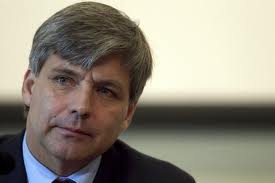By Andrew Warshaw
September 20 – The FIFA-appointed expert who first cautioned about the dangers of taking the 2022 World Cup to Qatar has come up with a timetable he says would allow for a winter tournament in January – and would satisfy most stakeholders.
The former Chilean FA president Harold Mayne-Nicholls, who led the FIFA inspection team that examined the credentials of all nine candidates for both the 2018 (won by Russia) and 2022 World Cups, says his calendar could apply to all confederations and that only a few leagues, most notably England’s Premier League, would be hard-pressed to accommodate it.
With a decision in principle to stage the Qatar tournament in winter likely to be taken next month by FIFA’s executive committee, Mayne-Nicholls says his blueprint could provide the answer to the global debate over match scheduling.
Under his plan, the 2021-22 season would begin on Aug 8, with leagues breaking around December 19 for three weeks of World Cup training and the tournament itself taking place from Jan 6 to Feb 6. Leagues would then resume on or around Feb 13 and finish in mid-June, a month later than usual in Europe.
Mayne-Nicholls has earmarked September 2021, for the World Cup playoffs with no more international dates required because of the event itself.
Only England, with its 38 Premier League games per club, two cup competitions and traditional festive fixtures, would find his schedule difficult to accept, he says.
“But maybe they could go further into June. Or play the cup competitions on week days. But this would only be for one season. Obviously there would be a shorter break for summer holidays but everyone has to give something. I don’t understand why the Bundesliga, for instance, are opposed to a winter World Cup because they don’t play in January anyway. I understand the importance of the festive period in England but they would only have to stop it for one season.”
Lower leagues, he says, could carry on playing throughout the World Cup even if some of their clubs are bound to provide players for the tournament. “You can’t stop everything. That would just be chaotic.”
Mayne-Nicholls’ proposed dates could well be close to those being studied by FIFA even though football’s world governing body is understood to prefer a November-December World Cup, in order to avoid a clash with the winter Olympics.
Mayne-Nicholls says this would only over-complicate matters.
“November creates even more trouble because almost all over the world – at least in Europe, South America, Asia and Africa – you are playing then. If you stop in November, you stop the world.”
He admits his timetable, which involves a slightly reduced but not insurmountable international programme over three seasons, does not take commercial contracts into consideration. “That’s another matter, I’m talking about the football problems, not the commercial side which of course will not be easy.”
Contact the writer of this story at moc.l1734873215labto1734873215ofdlr1734873215owedi1734873215sni@w1734873215ahsra1734873215w.wer1734873215dna1734873215

